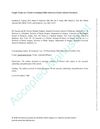 57 citations,
July 2005 in “Genetics”
57 citations,
July 2005 in “Genetics” Key genes are crucial for Drosophila wing development and could be insecticide targets.
 57 citations,
January 2003 in “Clinical and experimental dermatology”
57 citations,
January 2003 in “Clinical and experimental dermatology” Postmenopausal frontal fibrosing alopecia is a type of hair loss in postmenopausal women that may stop on its own but has no effective treatment.
 56 citations,
January 2021 in “Clinical and Experimental Medicine”
56 citations,
January 2021 in “Clinical and Experimental Medicine” The document concludes that while there are various treatments for Alopecia Areata, there is no cure, and individualized treatment plans are essential due to varying effectiveness.
 54 citations,
September 2012 in “Dermatologic Clinics”
54 citations,
September 2012 in “Dermatologic Clinics” Some medications can cause hair loss, but stopping the drug usually leads to recovery within 3 months.
 53 citations,
October 2018 in “Aesthetic Surgery Journal”
53 citations,
October 2018 in “Aesthetic Surgery Journal” Google Trends data on facial cosmetic procedures matches actual surgery numbers, showing it can help plastic surgeons understand public interest.
 53 citations,
May 2010 in “Dermatologic Surgery”
53 citations,
May 2010 in “Dermatologic Surgery” Hair transplantation may not work for Frontal Fibrosing Alopecia as transplanted hair was lost when the disease came back.
 51 citations,
January 2003 in “Hormone Research in Paediatrics”
51 citations,
January 2003 in “Hormone Research in Paediatrics” Hormones and their receptors, especially androgens, play a key role in hair growth and disorders like baldness.
 49 citations,
December 2018 in “JAAD case reports”
49 citations,
December 2018 in “JAAD case reports” Dupilumab may cause significant hair loss, which can reverse after stopping the drug.
 49 citations,
August 2003 in “Journal of The American Academy of Dermatology”
49 citations,
August 2003 in “Journal of The American Academy of Dermatology” Higher IGF-1 levels in hair follicles link to better finasteride results for hair loss.
 48 citations,
January 2017 in “Skin Pharmacology and Physiology”
48 citations,
January 2017 in “Skin Pharmacology and Physiology” Finasteride-loaded nanoparticles may help treat alopecia.










